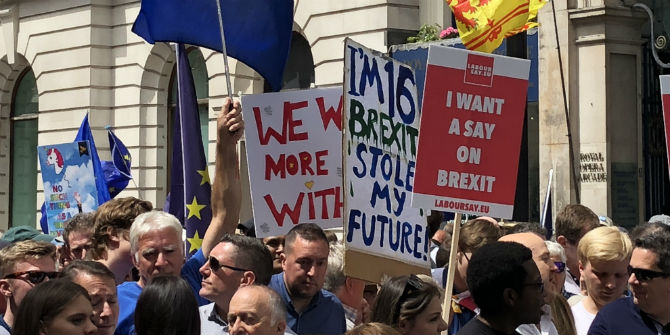 Britons are proving immune to the pressure from doomsayers to vote Remain in the referendum, writes Alan Sked. A vote to Leave is highly possible – and with it, the restoration of self-government, the arrival of cheaper goods from the rest of the world and an end to uncontrolled immigration from the EU. It would also mean the end of German-imposed austerity in southern Europe.
Britons are proving immune to the pressure from doomsayers to vote Remain in the referendum, writes Alan Sked. A vote to Leave is highly possible – and with it, the restoration of self-government, the arrival of cheaper goods from the rest of the world and an end to uncontrolled immigration from the EU. It would also mean the end of German-imposed austerity in southern Europe.
I am a historian and not a prophet. I cannot foretell the future, although as the sole founder in 1991 of a British political party specifically designed to convert the Conservative Party to withdrawal from the EU, I did lay the foundations of a strategy that may now be reaching fruition. Will Brexit be achieved on 23 June? I cannot say. However, it does seem likely that at least 45% of the British electorate will vote for it.

The prospect of Brexit, of course, terrifies the EU’s ruling class. And so it should. They should be more terrified, however, by the fact that, according to the latest data, 48% of Italians and 43% of the French want to leave the EU. The figure in Germany is 34%. A majority of French and Italians want their own referendum on the matter. The likelihood is, therefore, that any British exit would be immediately followed by demands in other EU countries to follow the British lead. Very soon, the EU could disappear.
This would be the EU’s own fault. It deliberately refused to make any major concessions to David Cameron in his ‘negotiations’ before he presented his ’reform package’ to Parliament and recommended a referendum on it. The concessions he did secure were rightfully rubbished in the British media and were of so little significance that in the present referendum debate they simply are not referred to. Instead, we have a prime minister who argues his case not with reference to a reformed EU – his original strategy – but with Project Fear. We are told that if Brexit happens, there will be world war, genocide, the collapse of the economy, terrorist infiltration and are only waiting to hear about plagues of locusts and the death of the firstborn. A couple of decades ago people shouting that the end of the world was nigh were locked up in lunatic asylums. Today they are housed in 10 Downing St. They are backed by the serried ranks of mobilised heads of foreign governments, heads of multinational corporations, heads of international economic organisations and a variety of military and intelligence chiefs.
The British people, however, have proved pretty immune to all this pressure. They know that their defence and intelligence needs will continue to be served by NATO and the ‘Five Eyes’ agreement between the UK, USA, Canada, Australia and New Zealand. They have little faith in economists who previously told them that entry into the ERM and the adoption of the euro was vital to their economic well-being and proved disastrously wrong. These were the same economists who notoriously failed to see the crash of 2008 coming. So Cameron’s and Osborne’s economic forecasts are treated as little better than horoscopes. Many are far more worried about uncontrolled immigration from the EU (including terrorists) especially if visa-free access is given to 129 million Turks, Kosovans, Georgians and Ukrainians. The pressure on British schools, the health service, social services and infrastructure is already too great. And they worry about EU plans – postponed till after the referendum—for a fiscal and banking union, a common defence policy and an increase in the EU budget. So Brexit is still highly possible.
What difference would it make to Britain? There would be celebrations in the streets. The pound might dip for a while but that would help our trade deficit. The most important thing would be the restoration of normal, democratic self-government, with a British government directly accountable to the British people through Parliament for the formulation and execution of all its policies, without the supervision of foreign bureaucrats or governments. European industrialists and international corporations would agree to free trade very quickly; they could not afford to lose the UK market, which, of course, would be opened up to cheaper food and goods from outside Europe. Very soon the whole, unpleasant experience of being part of the EU would be forgotten.
As for the EU, the sky would be black with chickens coming home to roost. Austerity in the Eurozone – with all that has meant for economies as diverse as Italy, Finland and Portugal – would have to be reassessed. Some solution would have to be found for the problem of Greece, whose democratically elected government was so humiliatingly crushed by German Diktat. Some solution would have to be found to the migration problem so casually exacerbated by the policies of the German Chancellor, including her deal with neo-fascist Turkey. The key priority, however, would be to hold the EU together as international financial speculators concentrated on the euro and member states began to manoeuvre for the exit. Brexit, therefore, would represent a new start for Britain but probably the end for the EU. Europe could become a community of free-trading, democratic nation states.
This post was originally published in German by Der Tagesspiegel. It represents the views of the author and not those of the BrexitVote blog, nor the LSE.
Alan Sked is Professor Emeritus of International History at the LSE.







Your outlook and experience on life is extremely narrow.
Away from your ivory towers in my rural county, there will be no parties in the streets. Instead the once busy fields of migrant workers will be replaced by crops rotting in the fields, and weeds now rampant and out of control.
The hospitals once under pressure to cope with 5 day working let alone 7 day working, will now be quarantined off, due to lack of doctors and staff. This being due to the fact that we have to import 40% of our NHS doctors from abroad not to mention nursing staff and cleaners too. UKIP will have them sent back to Europe with its xenophobic dogma.
Nursing homes will be failing their inspections by the drove due again to lack of EU workers willing to do jobs that strangely the UK Jobseekers would rather not.
The UK’s EU export customers would quickly find other EU trading partners to trade with, free of the red tape that the UK Government and the EU would bungle along with in a tit for tat trade war. After all, it will be in the EU’s best interests to make an example of the punishment it will dish out on deserters.
And strangely you have proved one thing. Turkey’s really do Vote for Christmas. The Education sector is going to be the hardest hit. Already EU applicants for under-graduate courses are holding off from joining UK courses due to the uncertainty of June 23rd. Courses cancelled, colleges closed, and lecturers made redundant.
Your only hope is that all the droves of ex-pats returning from retirement in the EU will take the low paid jobs left for them by ejected EU migrants. However the strain on public services by their arrival will make things even worse than they are already.
In a recent poll by the YMCA of young people aged 16-24, 72% wanted the UK to stay in Europe and 11% would vote for Brexit. It seems the grey-haired generation still want to relive the glory days of the British Empire as they are the age group swaying towards Brexit. This will mean that a Brexit vote on June 23rd will not be the final answer. It is very likely that another referendum will be called to approve the exit strategy and the terms of the UK leaving. The younger EU-phillic generation will eventually get their wishes.
A vote to leave on June 23rd would most certainly not be the final position.
Please note, the UK will still be in Europe after Brexit.
I’m so pleased to hear the leaving the EU would end the finanical slump and relieve the debt burdens of every country in the EU. And all those immigrants would be refused entry to the benefit of all (including the 44% of current immigrants who come from non-EU countries I’m assuming?).
Most of all, I’m glad to see arguments presented in the form of narrative prose instead of reasoning, and just ignoring all the established arguments so far on both sides of the debate. Not that I’m bitter or anything, just the same way you’re not bitter or anything about Cameron’s negotiations.
Brexit is fundamentally about whether we want to live in a society where the laws are made by governments that can be voted out of power every 4 years if we don’t like them, or be governed by an unelected, undemocratic dictatorship. If we vote to remain in Europe this is the legacy we will leave our children and our grandchildren because once this is decided on June 23rd it cannot be changed.
BREXIT – THE MOVIE details how Britain has been getting shafted by the EU since 1973 and is well worth a watch.
The EU have passed legislation that will fine member countries 250,000 Euros for every “refugee” they refuse to accept. Google it.
Swiss village Oberwil-Lieli fined 300,000 Euros for not accepting “refugees”. It has started already. Google it. This will happen in Britain if we remain in the EU.
Mr VababondTrader, Switzerland is not in the EU. Google it!
We already tried to have a Europe simply made up of “democratic nation states” – after World War 1.
We all know how long that lasted and what came next.
That was why they decided to do things differently after World War 2.
Mr Sked,
I am amazed at your narrow view of the World.
Do you not think that most Donald Trump voters would resonate with all the arguments you put forward:
1. We can’t get rid of the useless Washington bureaucracy
2. There are too many immigrants
3. Economists were wrong about 2008, they are wrong now and have nothing to say on policy
4. There would be more jobs and cheaper prices if we got rid of those bad trade deals. The new government will be a great negotiator.
Do you think the US should leave the EU as well?
Brexit will NOT solve the complicated economic and social problems facing the West today. Only by having institutions and governmental structures which create transnational compromise, demand peaceful co-operation and respect for the rule of law do we stand a chance of ensuring that quality of life for people in the West can continue to improve for future generations. The Leave Campaign have no answers to these bigger questions.